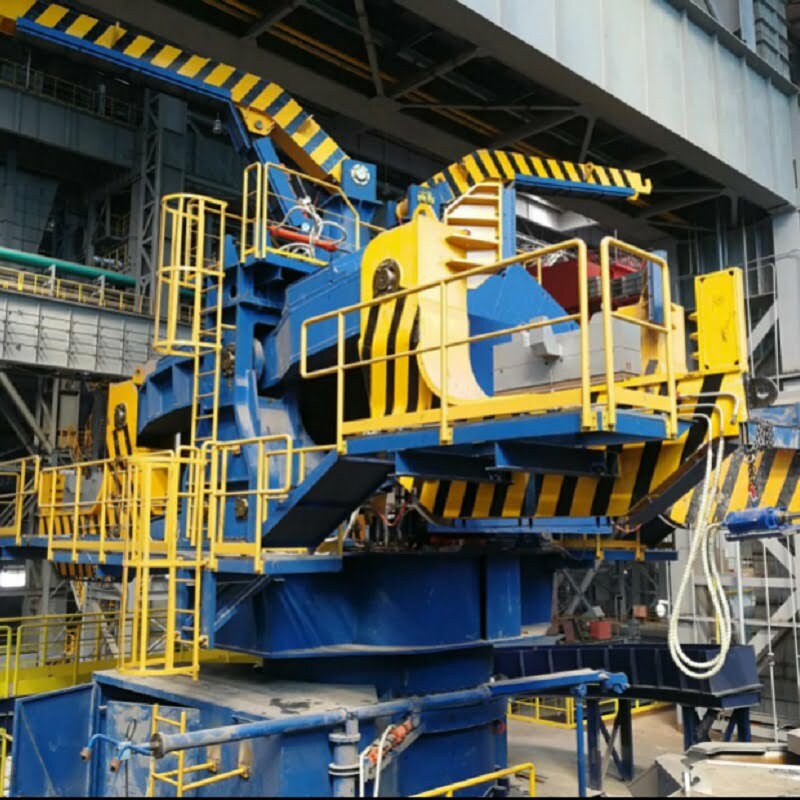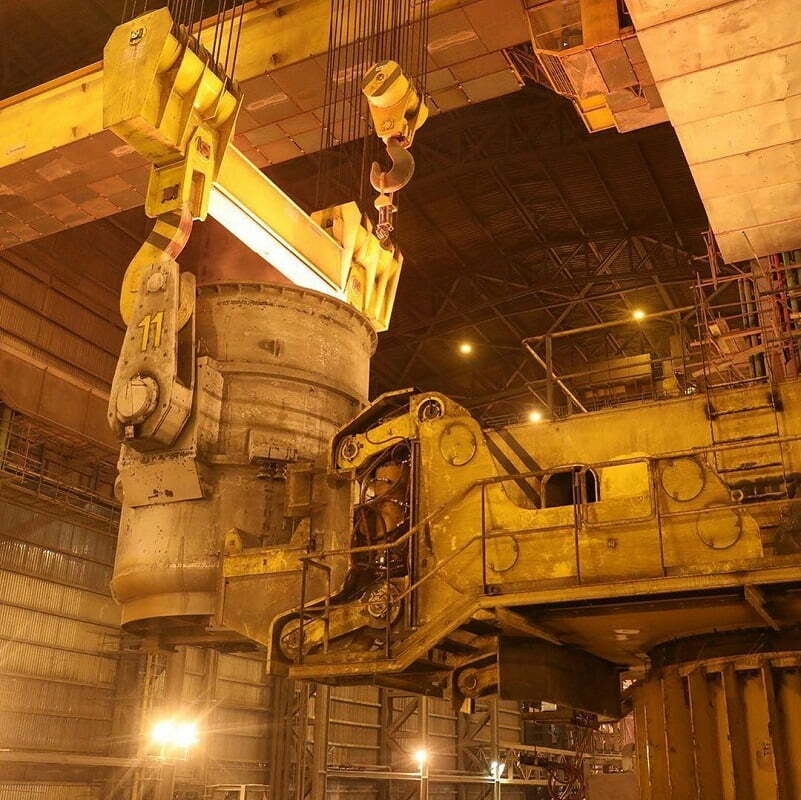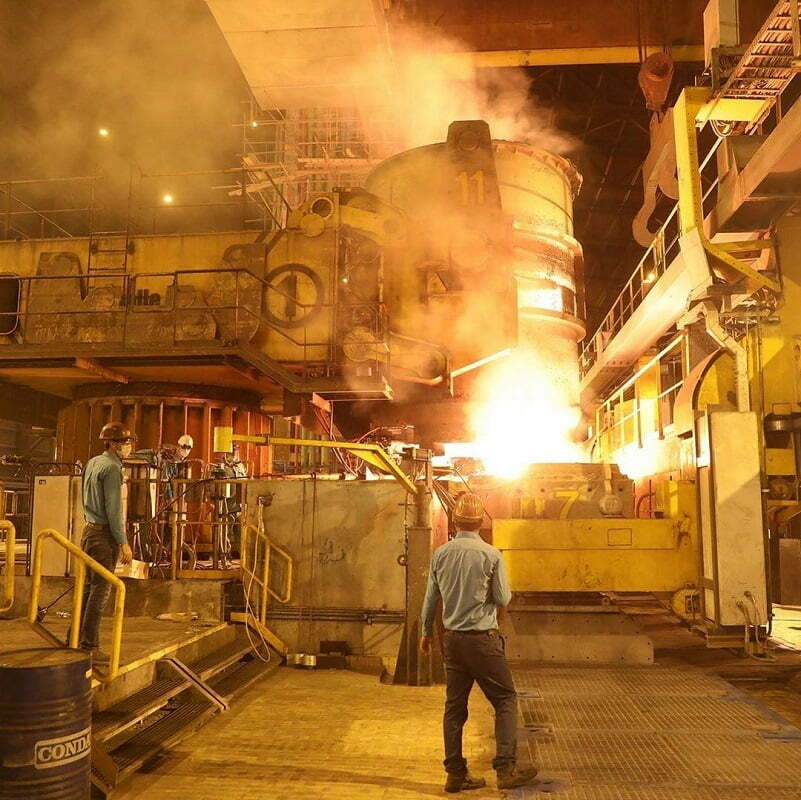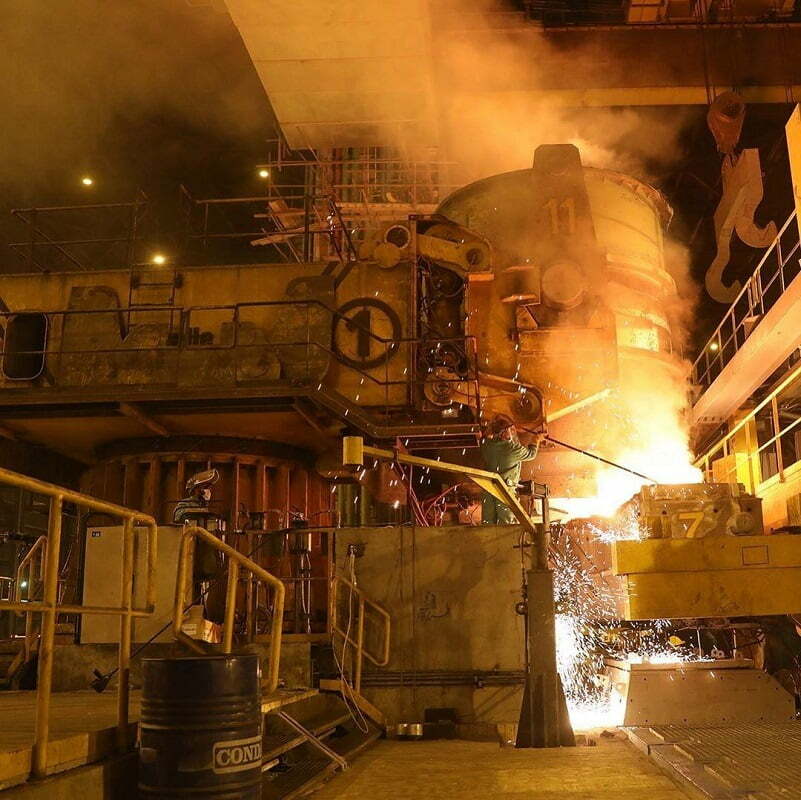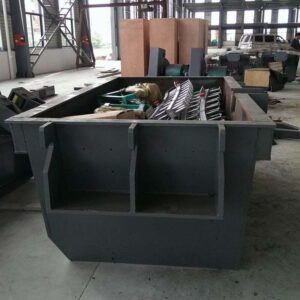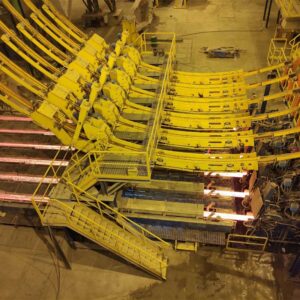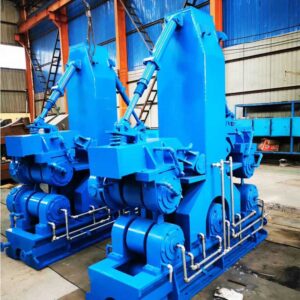Description
Ladle Turntable
The ladle turntable is mainly used for ladle transfer by the continuous caster. The ladle turntable is the most common equipment used in modern continuous casting to carry and support ladle pouring, usually between the receiving span of molten steel and the pouring span column.
The turning condition of our Ladle Turntable basically includes three conditions: no ladle on both sides, ladle on one side, and ladle on both sides. The weight of a single ladle can exceed 140 tons. Our ladle turret rotates smoothly, locates accurately, and has little impact on the mechanical parts when starting and stopping in order to reduce the fluctuation of liquid level and temperature drop in the tundish as well as the rotating time.
The designed turning radius of the ladle enables the nozzle of the ladle to be in the specified position above the tundish when pouring steel. Place the ladle on the turntable with the crane receiving the steel liquid across one side and rotate through the turntable so that the ladle stops above the tundish to supply the steel. The poured empty bags are rotated through the turntable and then transported back to the receiving span for molten steel.
After the steel-making furnace is tapped, the ladle is lifted to the end of the turntable to accept the ladle position by the traveling crane. The ladle is transferred to the casting position by the rotary drive and the molten steel is injected into the crystallizer through the intermediate tank for casting.
Ladle turntable: The equipment is set above the casting position of the continuous casting machine to carry the ladle across the span and support the ladle for casting. It consists of 6 parts: base, swivel arm, driving device, swing support, accident drive control system, lubrication system, and anchor.
Single-arm ladle turntable: composed of base, column, upper swivel arm, upper swivel arm drive device, lower swivel arm, and lower swivel arm drive device.
Butterfly-shaped ladle turntable: composed of a base, lifting hydraulic cylinder, turning frame, ladle support, turning arm, parallel connecting rod, driving device, and protective plate.
Parameter
Parameter of Continuous Caster Ladle Turntable
|
Main Parameter
|
||
|
Structural Style
|
Straight Arm Type, Lifting Type
|
|
|
Carrying Capacity
|
Straight Arm Type
|
220TMaximum 220T on One Side
|
|
Lifting Type
|
350TMaximum 350T on One Side
|
|
|
Auxiliary functions
|
Ladle Capping, Ladle Weighing, Accident turning
|
|
The ladle turntable is one of the key equipment of the continuous casting machine and plays an important role in connecting the upper and lower processes. The turning condition of the Ladle Turntable basically includes three conditions: no ladle on both sides, ladle on one side, and ladle on both sides. The weight of a single ladle has exceeded 140 tons.
The force of the ladle turret varies greatly under the three conditions, but in all cases, the smooth rotation and accurate positioning of the ladle turret must be ensured, and the impact on the mechanical part should be minimized when starting and stopping.
In order to reduce the fluctuation of liquid level and temperature drop in the tundish, the rotating time should be shortened.
Therefore, we have room for the capacity selection of the converter, i.e. one level higher than the motor power.
At the same time, the S-curve acceleration function of the frequency converter is utilized to ensure smooth and fast acceleration and deceleration curves by adjusting S-curve to reduce the impact on the decelerator, and then automatic high-speed and low-speed conversion and in-place parking during rotation are realized by PLC judging speed limit and stop limit, which meets the requirements for rotating time and smooth operation.
Features
(1) Heavy load. The ladle turret bears tens to hundreds of tons of ladle. When both swivel arms hold a ladle filled with steel, the load is the maximum.
(2) Offset load. There are 5 kinds of work carried by the ladle turntable: full load on both sides, empty, empty, empty, and empty. The maximum offset load occurs in the case of zero loads, at which time the Ladle Turntable will bear the maximum tipping torque.
(3) Shock. Since both the placement and removal of ladles are carried out by cranes, impact occurs when the ladles are moved.
This impact causes dynamic loads on parts of the turntable.
(4) High temperature. High-temperature molten steel in the ladle will generate heat radiation to the turntable, which results in additional thermal stress to the turntable between the ladles. In addition, the splashing of molten steel particles during pouring also brings fire hazards to the turntable.
Advantages
(1) The Ladle Turntable can exchange the ladle quickly and accurately, and the ladle can be replaced in place only after half a turn; At the same time, the ladle is supported during the waiting and pouring process without occupying the working time of the crane concerned.
(2) The Ladle Turntable occupies a small area of the pouring platform and does not affect the pouring operation.
(3) Operation is safe and reliable, easy to locate, and realize long-distance operation.
Customized Continuous Caster
We can design and manufacture the continuous caster according to the user’s steelmaking capacity, billet size, steel grade, and user site conditions. It can also be matched for manufacturers who already have continuous casting equipment.
Custom Range
Arc radius of casting machine: R2.5-10m
Billet species: square billet, round billet, slab, special-shaped billet
Continuous casting billet material: low carbon steel, low carbon alloy steel
Design production capacity: first-class 100,000 tons, second-class 200,000 tons, third-class 300,000 tons
Service
We can provide foundation layout and layout drawings
We will send engineers to your factory to install and debug machines and provide reliable after-sales service.
Competitive price and excellent quality
Our machines are easy to operate and maintain
Less investment
Stable performance
Products can be customized according to different needs
Production capacity can be adjusted according to customer requirements
Low energy consumption

